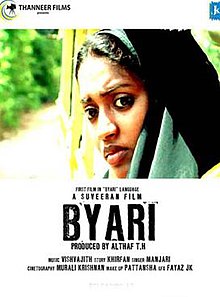Byari (film)

| Byari | |
|---|---|
 Theatrical release poster | |
| Directed by | K. P. Suveeran |
| Screenplay by | Suveeran |
| Produced by | T. H. Althaf Hussain |
| Starring | Mallika Althaf Hussain Mamukkoya |
| Cinematography | Muralikrishnan |
| Edited by | S. Manaohar |
| Music by | Viswajith |
Production company | Thanneer Films |
Release date |
|
Running time | 100 minutes |
| Country | India |
| Language | Byari/Beary |
| Budget | ₹7 million (US$84,000)[2] |
Byari is a 2011 Indian film in Beary language written and directed by Suveeran. It is the first feature film to be made in this language. The film was screened at various film festivals where it received positive reviews. It released in theatres in Dakshina Kannada region on 9 June 2011.
Byari won the National Film Award for Best Feature Film while Malayalam actress Mallika got a special mention from the National Film Award jury for her performance in the film.
Plot
[edit]The film depicts the culture, tradition and language of the Byari community. It highlights strict laws and regulations of marriage in the community, pros and cons of divorce in Islam and how it affects the women. The film, which is based on issues connected with Iddat (marriage) and Talaq (divorce) in Islam, tries to bring such problems to the notice of Islamic lawmakers. It was on the same day as she gets her first periods that Nadira's (Mallika) marriage is fixed. On that very disturbing day, it is to her childhood pal that she shares her concerns. Her husband who is thrice her age, despite the customs and traditions, loves her to the core. However, as she continues her content married life with her child, she gets divorced because of a dispute between her husband and her father.
Nadira is made to spend her life at her father's place devoid of any contact with the outside world. In the meantime, her husband takes the child away. Eventually bypassing many hurdles, it turns out that Nadira can spend her life with her husband yet again. However, for that as per the dictates of the law, she must marry and divorce some other man.
Cast
[edit]- Mallika as Nadira
- Althaf Hussain
- Mamukkoya
- Ambika Mohan
- Majeed
- K. T. S. Padannayil
- Prajeesh
- Aswathi
- Asha
- Rahim
Production
[edit]The film was Directed by Suveeran and produced by T.H. Althaf Hussain under the banner of Thanneer films. The shooting of the film took place in Dakshin Kannada districts like Suratkal, Jokatte, Bajpe, Thokottu and parts of Karnataka.[2][3][4][5][6][7][8][9][10][11]
Awards
[edit]- 2011: National Film Award for Best Feature Film
- 2011: National Film Award – Special Mention – Mallika
- 2012: SAARC film Bronze Award – (From Sri Lanka)
See also
[edit]References
[edit]- ^ "'Byari' bags National Award for Best Film, 'Dirty' Balan Best Actress". CoastalDigest.
- ^ a b "Mangalore: 'Byari' the Movie Aims to Stress on Community Justice". Mangalorean.com. Archived from the original on 4 March 2016. Retrieved 6 June 2011.
- ^ "ബ്യാരി മികച്ച ചിത്രം: വിദ്യാ ബാലന് നടി , Hindi – Mathrubhumi Movies". Mathrubhumi.com. 7 March 2012. Archived from the original on 13 March 2012. Retrieved 16 March 2012.
- ^ വിദ്യാ ബാലൻ മികച്ച നടി, ഗിരീഷ് കുൽക്കർണി നടൻ. Manorama Online. 7 March 2012. Archived from the original on 9 March 2012. Retrieved 16 March 2012.
- ^ "Home | At a glance |". Manorama Online. Retrieved 16 March 2012.[permanent dead link]
- ^ "National Awards for Vidya Balan, Onir's 'I AM' – Movies News News – IBNLive". Ibnlive.in.com. Archived from the original on 9 March 2012. Retrieved 16 March 2012.
- ^ "'Byari' a study on the ethnic community: K P Suveeran". The Times of India. 7 March 2012. Archived from the original on 20 July 2013. Retrieved 16 March 2012.
- ^ "Here's why Byari won the National Award for Best Film". Rediff.com. 7 March 2012. Retrieved 16 March 2012.
- ^ "Byari, Deool share Best Feature Film award". domain-b.com. 7 March 2012. Retrieved 16 March 2012.
- ^ "Unexpected, overwhelmed: National award winners react – Entertainment – DNA". Dnaindia.com. 7 March 2012. Retrieved 16 March 2012.
- ^ "Complete list of National Film Awards Winners 2011". DearCinema.com. 7 March 2012. Archived from the original on 9 March 2012. Retrieved 16 March 2012.